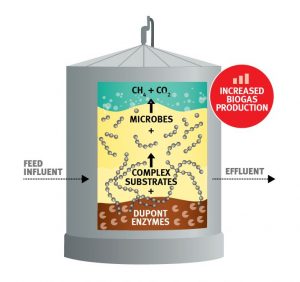DuPont Industrial Biosciences and MIAVIT GmbH have forged a biogas enzyme supply contract. An integral part of the agreement will be DuPont supplying enzymes for incorporation in MIAVIT biogas boosting products. According to DuPont, its enzyme technology is proven to improve several production areas including biogas yields and process robustness. This, says DuPont, will increase revenues and profitability.

Enzymes break down large polymers into smaller sugars and amino acids more suitable for biogas-producing organisms.
MIAVIT will be adding DuPont’s FIBREZYME® G4 enzyme biotechnology for inclusion in its MiaMethan® ProCut, a new biogas ingredient for the ag sector. The product, says MIAVIT, improves the breakdown of difficult to digest materials enabling more efficient biogas conversion. FIBREZYME G4 comes in a powder format to help reduce viscosity of hard to digest materials by over 60 percent, according to DuPont, thus enabling faster processing time.
“We are constantly innovating to offer our customers the latest technology to improve profitability and opportunity in the marketplace,” said Franz Otten, managing director of Sales at MIAVIT. “As new technology, like FIBREZYME® from DuPont, comes online, we see tremendous opportunity for our customers to improve efficiency and yields. This, in turn, provides the emerging biogas industry a new revenue stream, particularly for rural and farm communities, from materials that would ordinarily go to waste – reducing damaging environmental impacts and expanding renewable options for power generation.”
Enzymes are an important element to more effective and efficient biogas production. They serve to accelerate the breakdown of materials such as animal and food and farm waste, resulting in sugars and amino acids more pliable for conversion into biogas. The resulting renewable methane biogas can then to used to generate electricity or can be compressed and transported into a pipeline gas grid.
“DuPont is focused on continuous innovation for our customers,” added Conrad Burke, global marketing director at DuPont Industrial Biosciences. “Customers can expect this technology to increase biogas production, improve biogas quality, shorten process time and reduce the amount of feedstock required – all backed by our decades of experience in the global industrial enzyme and renewable energy businesses.”
This is not DuPont’s first enzyme entry for the biogas market. Back in July the company launched OPTIMASH® AD-100, a new liquid enzyme that DuPont says has been shown to produce up to a 13 percent increase in biogas yields in anaerobic digesters.

